Meet Our Program Scholars
Selection for the program is competitive and is prestigious recognition of outstanding accomplishments in promoting diversity, equity, inclusion, and accessibility. (Bios are as of 3/14/23)
Scholars
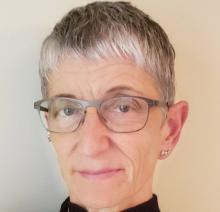
Dolores Arjona (Lola), Ph.D.
Scientific Review Officer Mechanisms of Cancer Therapeutics B – MCTB Cancer Therapeutics (CTH) Review Branch Division of Translational and Clinical Sciences Center for Scientific Review (CSR)
Dr. Dolores Arjona (Lola) earned her Ph.D. in molecular biology at the Universidad Autonoma of Madrid in Spain. She completed her postdoctoral training at Virginia Commonwealth University and the National Cancer Institute, focused on molecular genetics and epigenetics of astrocytic gliomas. Prior to joining CSR in 2021, Dr. Arjona worked in the clinical genetic testing industry at GeneDx for over 10 years as director of the analysis department, providing administrative and technical oversight of a large interdisciplinary and multicultural team. As a scientific review officer, Dr. Arjona oversees peer review process of applications submitted to the Mechanisms of Cancer Therapeutics study section. She volunteers as cochair of the Observances subcommittee of the Inclusion Diversity Equity Accessibility (IDEA) Council and supports the training team at CSR.
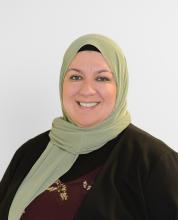
Hibah O. Awwad, Ph.D.
Program Director, Traumatic Brain Injury Repair & Plasticity Cluster Division of Neuroscience National Institute of Neurological Disorders and Stroke (NINDS)
Dr. Hibah Awwad oversees and manages the portfolio for basic and translational research related to Traumatic Brain Injury at NINDS. Dr. Awwad earned her bachelor's degree in pharmacy from Amman University, Jordan. She worked at the Gulf Pharmaceutical Industries in Dubai, United Arab Emirates, before earning her doctorate degree in pharmacology from the University of Houston. Prior to joining NINDS, Dr. Awwad served as a clinical assistant professor at the University of Oklahoma Health Sciences Center and was recognized with awards for her excellence in teaching, mentoring and research. She has also served as an advisor for Muslim professional students and Arab scientist organizations throughout her academic career. Dr. Awwad has mentored young scientists with diverse backgrounds throughout their early career stages and is passionate to continue mentoring future scientists in her role at NINDS.
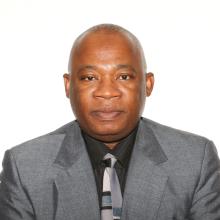
Magnus A. Azuine, Ph.D., M.P.H., M.Sc.
Scientific Review Officer Scientific Review Branch Division of Extramural Research Eunice Kennedy Shriver National Institute of Child Health and Human Development (NICHD)
Dr. Magnus A. Azuine joined NICHD as a scientific research officer from the Health Resources and Services Administration (HRSA). Dr. Azuine started his federal career as a public health analyst/project officer in 2009 at HRSA’s Bureau of Health Professions. From 2012–2022 he served at the HIV/AIDS Bureau as a project officer for the Ryan White HIV/AIDS program. He also served as a project officer for the Public Health Scholarship Program, Bureau of Health Workforce. Earlier Dr. Azuine worked as assistant scientist, Johns Hopkins University; research associate, George Washington University; visiting scientist, Howard University; and research fellow, National Institute for Medical Research and National Institute for Pharmaceutical Research and Development in Nigeria. He holds a Ph.D. (biochemistry), M.Sc. (life sciences), M.P.H. (global health), and post-graduate certificate (HIV/AIDS studies). He completed postdoctoral training in pharmaceutical biology at the Institute for Pharmacy, Freie University. Dr. Azuine is a recipient of the Alexander von Humboldt Research Fellowship Award in Germany.

Nagaraja Sethuraman Balakathiresan (Sethu), Ph.D.
Program Officer Division of Neuroscience and Behavior (DNB) National Institute on Alcohol Abuse and Alcoholism (NIAAA)
Dr. Sethu Balakathiresan has been a program officer at the NIAAA’s Division of Neuroscience and Behavior since July 2021. He got his master's and doctoral degrees from Madurai Kamaraj University in India. He had several years of postdoctoral experiences in the U.S. in multiple biomedical fields, including breast cancer at Howard University, malaria at the University of Maryland Biotechnology Institute, and cystic fibrosis at Uniformed Services University. Later, he joined as a staff scientist/assistant professor of pathology at USU and worked on developing novel blood biomarkers for clinical diagnoses and therapeutics for traumatic brain injury (TBI) and posttraumatic stress disorder (PTSD). He has multiple TBI and PTSD biomarker-related publications, including the first reports on novel blood biomarkers on TBI and PTSD, book chapters, and patents. Within the DNB, Dr. Balakathiresan is responsible for the program portfolios of all aspects of comorbid Alcohol Use Disorder and PTSD, sleep disorders, and biomarkers.

Utibe Bickham-Wright, Ph.D., PMP
Social and Behavioral Sciences Administrator (Program Official) Division of Integrative Biological and Behavioral Sciences (DIBBS) National Institute on Minority Health and Health Disparities (NIMHD)
Dr. Utibe Bickham-Wright is a social and behavioral sciences administrator in the Division of Integrative Biological and Behavioral Sciences at NIMHD. Her work promotes understanding causes of health disparities and increasing diversity in the biomedical workforce. Prior to joining NIMHD, she was an AAAS Science & Technology Policy Fellow, working at the National Science Foundation with the ADVANCE program. In this role, Dr. Bickham-Wright promoted organizational change for gender equity in STEM academic professions. She also developed and led the NSF Taking Action: COVID-19 Diversity, Equity and Inclusion Challenge, an initiative promoting long-term interventions by colleges and universities to mitigate the effects of the COVID-19 pandemic on their populations. Dr. Bickham-Wright is a certified Project Management Professional and holds a B.S. in biological sciences from Louisiana State University and A&M College, and a Ph.D. in cellular and molecular pathology from the University of Wisconsin-Madison.

Miranda M. Broadney, M.D., M.P.H.
Program Director Division of Endocrinology and Metabolism National Institute of Diabetes and Digestive and Kidney Diseases (NIDDK)
Dr. Miranda Broadney completed her M.D. and M.P.H. at the Ohio State University in 2011, pediatric residency at the University of Arizona in 2014, and pediatric endocrinology fellowship at the National Institute of Child Health and Human Development (NICHD) in 2017. She subsequently remained with NICHD, executing clinical trials in youth testing, understating prediabetes, and altered glucose metabolism in people at risk for type 2 diabetes. Dr. Broadney additionally provided a year of clinical service at the University of Maryland prior to joining NIDDK. In this current role, Dr. Broadney provides administrative and scientific oversight for clinical studies on the diagnosis, management, and treatment of diabetes mellitus. She directs the Type 1 Diabetes Therapeutics Program which focuses on applications studying the clinical management of type 1 diabetes in youth and adults. Dr. Broadney also oversees several clinical consortia for NIDDK encompassing youth onset T2D, gestational diabetes, and diabetes health equity and stakeholder engagement.

David Dean, Jr. (Chipper), Ph.D., M.S.
Program Director Health Behaviors Research Branch Division of Cancer Control and Population Sciences National Cancer Institute (NCI)
Dr. David Dean Jr. (Chipper) is a developmental-health psychologist and program director in the Health Behaviors Research Branch at NCI, where he helps coordinate behavioral health (mental health and substance use) and minoritized population research, particularly for sexual and gender minorities, across the cancer control continuum. Previously, he was senior research leader at IBM Watson Health, consulting with the Centers for Medicare and Medicaid Services on behavioral health services research and evaluation support. Prior to that, he served as chief of the Analysis and Services Research Branch at the Substance Abuse and Mental Health Services Administration, where he directed the National Registry of Evidence-based Programs and Practices in behavioral health and was assistant professor of health psychology at Bucknell University. He received his Ph.D. in educational and developmental psychology from Columbia University and received postdoctoral training in psychology and public health at the University of Washington.
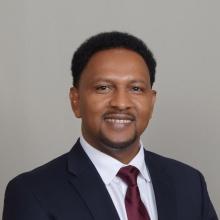
Temesgen D. Fufa, Ph.D.
Program Director Division of Genome Sciences National Human Genome Research Institute (NHGRI)
Dr. Temesgen Fufa is a Program Director at NHGRI in the Division of Genome Sciences, where he directs a portfolio of research grants focused on genome structure and function, including technology development for single-molecule sequencing and the application of multi-omics technologies. Dr. Fufa's portfolio also includes managing NHGRI's training grants as well as initiatives aimed at diversifying genomics and global health research such as through the H3Africa program. Previously, Dr. Fufa served as a Staff Scientist at the National Eye Institute where he led research focused on stem cells, functional genomics, and multiomics to elucidate the mechanisms of developmental diseases. Dr. Fufa received a M.S. in Biochemistry and Molecular Biology with a major in Biotechnology from Georgetown University School of Medicine, and a Ph.D. in Biochemistry and Molecular Biology from Howard University College of Medicine. He completed his dissertation research at NCI’s Laboratory of Receptor Biology and Gene Expression and his postdoctoral research training at NHGRI in the Genetic Disease Research Branch.

Anne Gershenson, Ph.D.
Program Director Division of Biophysics, Biomedical Technology, and Computational Biosciences National Institute of General Medical Sciences (NIGMS)
Dr. Anne Gershenson joined the Division of Biophysics, Biomedical Technology and Computational Biosciences at NIGMS as a program officer in 2021. Her portfolio focuses on computational biophysics including protein design and computational drug design and screening. As the NIGMS contact for the R15 research enhancement award program, Dr. Gershenson is committed to helping communities and institutions that receive little or no NIH funding. She has degrees in physics from Bryn Mawr College (A.B.) and the University of Michigan (Ph.D.) and received post-doctoral training at Caltech and the University of Illinois Urbana-Champaign. Dr. Gershenson was a faculty member at Brandeis University and the University of Massachusetts Amherst where her research focused on protein-membrane interactions and protein structural changes. As a practitioner of collaborative, interdisciplinary science she applied a variety of experimental biophysical methods to systems ranging from cells to plants to biofilms.

Jamie Lahvic, Ph.D.
Program Officer Office of Strategic Extramural Programs National Institute on Aging (NIA)
Dr. Jamie Lahvic is a program officer in the Office of Strategic Extramural Programs at NIA. She helps to manage policy, communications, evaluation and new funding opportunity development for NIA’s training and career development portfolio, specializing in fellowships and career transition awards. Additionally, Dr. Lahvic directs the mentorship program of NIA’s Health Aging Startup Challenge. Dr. Lahvic earned her Ph.D. in developmental and regenerative biology at Harvard Medical School in 2017, with a thesis focused on lipid-GPCR signaling in hematopoietic stem cells. She continued to a postdoc at the University of California, Berkeley, where she focused on cell competition during tumor initiation. She joined the NIA as an AAAS Science and Technology Policy Fellow in 2021.

Lindsey Ann Martin, Ph.D.
Health Scientist Administrator Population Health Branch Division of Extramural Research and Training National Institute of Environmental Health Sciences (NIEHS)
Dr. Lindsey Ann Martin earned her Ph.D. in anthropology (specializing in medical anthropology) from Wayne State University in Detroit. She completed a health services research postdoctoral fellowship at the Center for Innovations in Quality, Effectiveness & Safety (IQuESt) at the Houston VA and then served as IQuESt’s lead qualitative methodologist before coming to NIEHS in 2020. At NIEHS, she administers a research portfolio that includes environmental health disparities, social determinants of health and community engaged research methods. She completed the NIH Training Institute for Dissemination and Implementation Research in Health and leads NIEHS’ efforts to build capacity in implementation science to inform the uptake and sustainability of interventions to advance environmental health equity. Additionally, she serves as a project scientist for the NIH Common Fund’s Transformative Research to Address Health Disparities and Advance Health Equity program and the Community Partnerships to Advance Science for Society) program.

Leonie Misquitta, Ph.D.
Program Director Division of Clinical Innovation National Center for Advancing Translational Sciences (NCATS)
Dr. Leonie Misquitta manages a portfolio of the Clinical and Translational Science Awards, including the largest real world data enclave, the National COVID Cohort Collaborative. For 20 years, she has led a variety of scientific initiatives across a broad spectrum—from developmental genetics and transgenics to large-scale translational and biomedical informatics programs. Before joining NCATS, she was a senior scientific advisor at the Center for Information Technology intramural program, implementing NIH-wide initiatives for standards in data science. As a Fogarty fellow at the National Cancer Institute, she pioneered the techniques of gene silencing and RNA-interference in Drosophila. She earned her Ph.D. from Devi Ahilya University, India, and an executive management certification from Georgetown University. In addition to her cross-disciplinary translational science interests, she strongly believes in scientific and workforce equity and diversity and works toward building a talent pool of interdisciplinary investigators that is practical and sustainable.

Karen Plevock Haase, Ph.D., M.S.
Program Officer Implementation Science Branch Center for Translation Research and Implementation Science National Heart, Lung, and Blood Institute (NHLBI)
Dr. Karen Plevock Haase received her B.S. in biology and M.S. in molecular and cellular biology from the University of Massachusetts Amherst. She received her Ph.D. in biophysics in a joint graduate partnership program between the University of North Carolina at Chapel Hill and NHLBI. She went on to do a postdoc at NICHD where she also completed a detail supporting CARING for Children with COVID. After her time at NICHD, she joined the National Cancer Institute Office of Data Sharing where she supported the Childhood Cancer Data Initiative among other data sharing projects. In April 2022, Dr. Plevock Haase joined the NHLBI Center for Translation Research and Implementation Science in the Implementation Science Branch as a program officer. There she co-leads two maternal health implementation science programs, the Maternal Health Community Implementation Program and IMPROVE Community Implementation Program.

Amanda Alise Price, Ph.D.
Director of the Office of Health Equity and Chief Scientific Diversity Officer National Institute of Child Health and Human Development (NICHD)
Dr. Amanda Alise Price is the Director of the Office of Health Equity and Chief Scientific Diversity Officer at NICHD. She joined NIH in 2020 as a Health Scientist Administrator- Program Director, most recently directing the preventive medicine portfolio and serving as a Team Lead at NINR, and previously at NCI’s Center for Addressing Cancer Health Disparities. Prior to NIH, Dr. Price was a tenured Associate Professor in the School of Health Sciences at Winston-Salem State University, where she taught, trained, and mentored underrepresented scholars in the biomedical sciences. She also successfully competed for NIH funding as a PI and generated publications and presentations from her work centered on the prevention of chronic diseases through promotion of healthy lifestyle behaviors, with an emphasis on addressing health disparities and promoting health equity. Dr. Price earned a Ph.D. and B.S.Ed. in exercise physiology, with a doctoral concentration in statistics and undergraduate minors in chemistry and sports medicine, from the University of Miami.
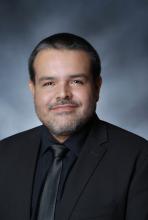
Mauricio Rangel-Gomez, Ph.D.
Program Chief, Learning and Memory Division of Neuroscience and Basic Behavioral Science National Institute of Mental Health (NIMH) Team Lead for Integrated Approaches BRAIN Initiative
Dr. Mauricio Rangel-Gomez joined NIMH in 2020 where he combines his efforts in supporting basic neuroscience research with his passion for the reduction of health disparities and the support of diversity, equity, inclusion, and accessibility at NIH. Dr. Rangel-Gomez supports various NIMH and trans-NIH efforts in the field of health disparities and DEIA, including the Social Determinants of Health workgroup, the mental health disparities team and the global mental health team. Dr. Rangel-Gomez earned bachelor’s degrees in psychology and engineering in Colombia, and a master’s degree in neuropsychology and doctorate in cognitive neuroscience in the Netherlands. Before coming to NIH, he conducted basic and applied research aiming to understand the mechanisms of memory, attention, and reward responses. Dr. Rangel-Gomez joined the government through a fellowship to work at FDA, where he managed the FDA-NIH cooperation for the funding of projects aimed to support regulatory science.

Carmen Ufret-Vincenty, Ph.D.
Scientific Review Officer Transplantation, Tolerance and Tumor Immunology Study Section (TTT) Immunology and Infectious Diseases B (IIDB) Branch Division of Physiological, Pathological Sciences (DPPS) Center for Scientific Review (CSR)
Dr. Carmen Ufret-Vincenty obtained her Ph.D. in biochemistry from the University of Maryland School of Medicine, where her research focused on intracellular calcium signaling and its association with cell growth. She then embarked on research projects encompassing a range of disciplines, taking her from the Institute of Neurobiology in San Juan, Puerto Rico, to the Department of Physiology and Biophysics at the University of Washington. Prior to joining CSR in 2022, Dr. Ufret-Vincenty was director of lung transplant research at the Cystic Fibrosis Foundation, developing and overseeing research programs, building novel biorepositories linked to patient registries, and directing grant peer review. She now serves as scientific review officer of the Transplantation, Tolerance, and Tumor Immunology study section in the Immunology and Infectious Diseases B review branch. Involvement in DEIA initiatives has been a common thread throughout her volunteerism and professional journey.

